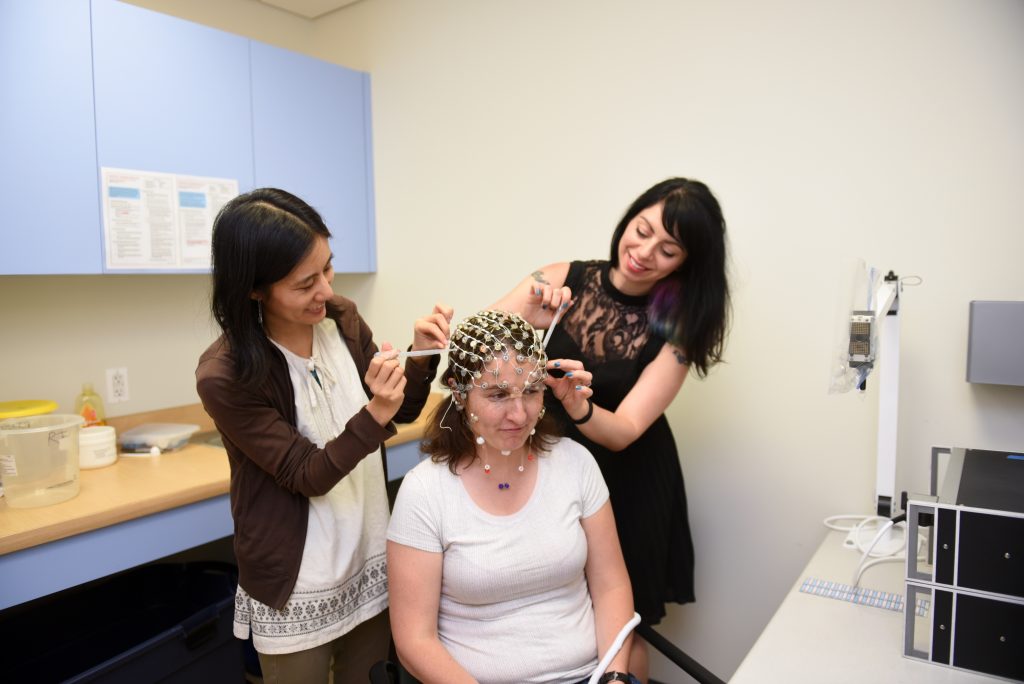Laboratories for Communication Sciences & Disorders
Students are encouraged to participate in our research projects.
The department of Communication Sciences and Disorders, housed within the Ruth S. Ammon College of Education and Health Sciences, plans to relocate all its various laboratories to Linen Hall in the coming year.

Research at the Neurophysiology in Speech-Language Pathology Lab (NSLP).
Labs
Neurobiology of Language and Behavior (NoLaB) Lab
Director Sladjana Lukic
The neurobiology of language and behavior (NoLaB) lab focuses on the two lines of research: [1] the neurocognitive correlates of the language system and [2] its relation with emotions and other cognitive systems. Under Dr. Lukic direction the NoLaB lab supports several ongoing studies on vascular and primary progressive aphasias and outside collaborations including Columbia University, Northwestern University, University of California San Francisco, and University of Geneva. One of the main priorities of the NoLaB is building a sustainable, welcoming and all-inclusive environment for all students. This is especially important during the earliest stages of academic career, when successful training of undergraduate students is tightly dependent on the fine process of pruning of theoretical knowledge by selected, empirically driven, examples from clinical practice. The NoLaB research platform is designed to encompass, not just basics of scientific method – principles of data collection, data analyses, and data interpretation, but also importance of multidisciplinary work, open science, and continuous education. Together, we strive to build a fully integrative lab atmosphere, complementary to students’ future clinical and academic careers. Are you interested in our research? Get in touch!
Neurophysiology in Speech Language Pathology (NSLP) Lab
Director: Reem Khamis, PhD
Currently in Hy Weinberg Center, Room 114
Research at the NSLP Lab focuses on examining the neural underpinnings of language learning in specific sociolinguistic situations, specific communication and language disorders, as well as during rehabilitation using event-related potentials (ERPs) recorded from 32 electrode arrays placed on the scalp combined with behavioral data.
The Language, Learning, and Literacy (Tri-L) Lab
Director: Jason Rosas, PhD
The Language, Learning and Literacy (Tri-L) Lab studies language development in monolingual and bi-/multilingual learners across the lifespan. Using a combination of behavioral language observation, survey methodology and neurophysiology studies, the Tri-L Lab explores questions of language diversity and cultural/societal influences on communication behavior, as well as ideal forms of assessment and intervention for populations with developmental, acquired and functional language disorders. Our goal is to inform science and policy that promotes acknowledgment of language differences and educates clinicians in the speech-language sciences to view disorder and disability through a new lens.
The Voice and Quality of Life Laboratory (VQLL)
Director: Steven Cox, PhD
The VQLL seeks to investigate clinically based research questions focused on the human voice and how voice disorders can impact individuals’ physical, psychological, and social functioning. Particular emphasis is placed on individuals who undergo treatment for head and neck cancer. For example, individuals who have their voice box removed due to cancer often require an alternate method of speaking (e.g., ‘alaryngeal’ voice and speech). As a result, they can experience numerous changes in physical, psychological and social functioning. The VQLL focuses on the role of speech-language pathology and inter-professional intervention toward improving the quality of life for individuals with voice disorders, including laryngectomees.
Augmentative/Alternative Communication (AAC) Lab
Director: Cindy Arroyo, DA
The AAC Lab provides evaluations/consultations for individuals with severe communication impairments, as well as opportunities for teaching and research in the use of technology for individuals with severe communication impairments.
Speech Science Lab
Director: Laura L. Koening, PhD
The Speech Science Lab was originally developed by emeritus professor Dr. Lawrence Raphael. It includes specialized hardware and software that can be used to assess speech acoustics, aerodynamics (oral airflow), and articulatory contacts (electropalatography). Dr. Koenig has been working to add to and modernize this equipment. We have recently obtained newer equipment to measure air pressures during speech, a portable digital audio recorder that provides high-quality sound recording and can be used off-site, and a wireless microphone system—quite useful for recording young children, since the children can move freely while being recorded.